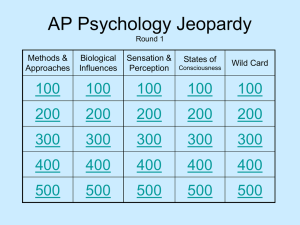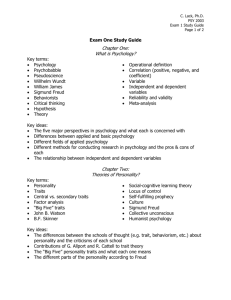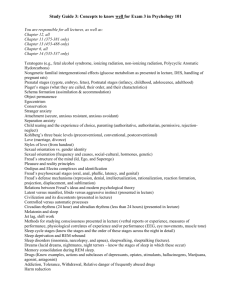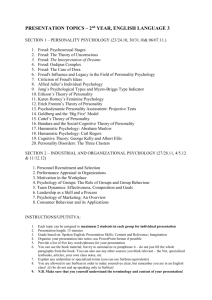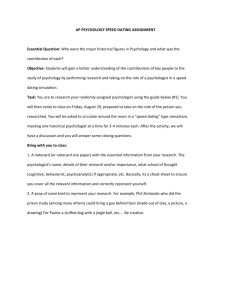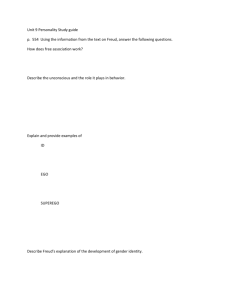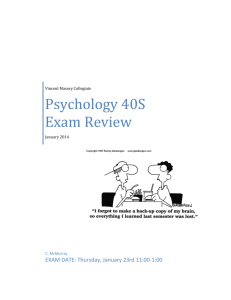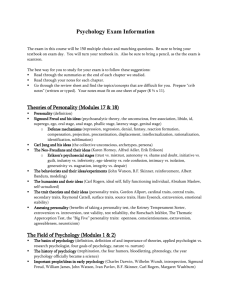AP Psychology Review Important people glossary style
advertisement
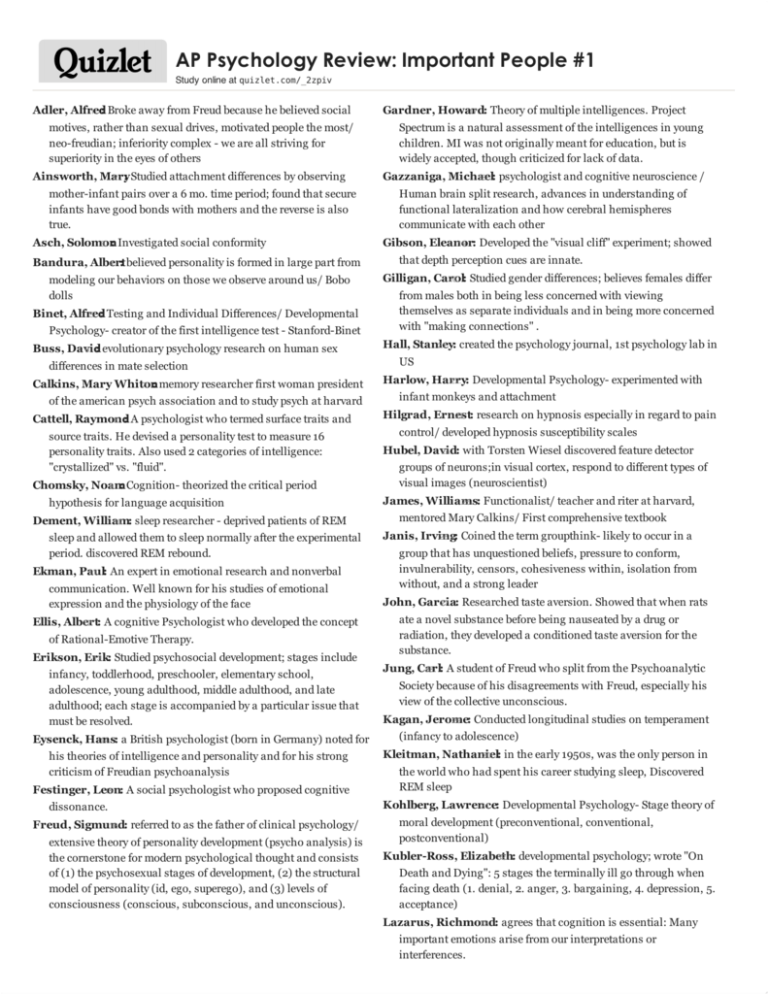
AP Psychology Review: Important People #1 Study online at quizlet.com/_2zpiv Adler, Alfred 1. : Broke away from Freud because he believed social motives, rather than sexual drives, motivated people the most/ neo-freudian; inferiority complex - we are all striving for superiority in the eyes of others Ainsworth, Mary 2. : Studied attachment differences by observing mother-infant pairs over a 6 mo. time period; found that secure infants have good bonds with mothers and the reverse is also true. Asch, Solomon 3. : Investigated social conformity Bandura, Albert 4. : believed personality is formed in large part from modeling our behaviors on those we observe around us/ Bobo dolls Binet, Alfred 5. : Testing and Individual Differences/ Developmental Psychology- creator of the first intelligence test - Stanford-Binet Buss, David 6. : evolutionary psychology research on human sex differences in mate selection Calkins, Mary Whiton 7. : memory researcher first woman president of the american psych association and to study psych at harvard Cattell, Raymond 8. : A psychologist who termed surface traits and source traits. He devised a personality test to measure 16 personality traits. Also used 2 categories of intelligence: "crystallized" vs. "fluid". Chomsky, Noam 9. : Cognition- theorized the critical period hypothesis for language acquisition Dement, William 10. : sleep researcher - deprived patients of REM sleep and allowed them to sleep normally after the experimental period. discovered REM rebound. Ekman, Paul 11. : An expert in emotional research and nonverbal communication. Well known for his studies of emotional expression and the physiology of the face Ellis, Albert 12. : A cognitive Psychologist who developed the concept of Rational-Emotive Therapy. Erikson, Erik 13. : Studied psychosocial development; stages include infancy, toddlerhood, preschooler, elementary school, adolescence, young adulthood, middle adulthood, and late adulthood; each stage is accompanied by a particular issue that must be resolved. Eysenck, Hans 14. : a British psychologist (born in Germany) noted for his theories of intelligence and personality and for his strong criticism of Freudian psychoanalysis Festinger, Leon 15. : A social psychologist who proposed cognitive dissonance. Freud, Sigmund 16. : referred to as the father of clinical psychology/ extensive theory of personality development (psycho analysis) is the cornerstone for modern psychological thought and consists of (1) the psychosexual stages of development, (2) the structural model of personality (id, ego, superego), and (3) levels of consciousness (conscious, subconscious, and unconscious). Gardner, Howard 17. : Theory of multiple intelligences. Project Spectrum is a natural assessment of the intelligences in young children. MI was not originally meant for education, but is widely accepted, though criticized for lack of data. Gazzaniga, Michael 18. : psychologist and cognitive neuroscience / Human brain split research, advances in understanding of functional lateralization and how cerebral hemispheres communicate with each other Gibson, Eleanor 19. : Developed the "visual cliff" experiment; showed that depth perception cues are innate. Gilligan, Carol 20. : Studied gender differences; believes females differ from males both in being less concerned with viewing themselves as separate individuals and in being more concerned with "making connections" . Hall, Stanley 21. : created the psychology journal, 1st psychology lab in US Harlow, Harry 22. : Developmental Psychology- experimented with infant monkeys and attachment Hilgrad, Ernest 23. : research on hypnosis especially in regard to pain control/ developed hypnosis susceptibility scales Hubel, David 24. : with Torsten Wiesel discovered feature detector groups of neurons;in visual cortex, respond to different types of visual images (neuroscientist) James, Williams 25. : Functionalist/ teacher and riter at harvard, mentored Mary Calkins/ First comprehensive textbook Janis, Irving 26. : Coined the term groupthink- likely to occur in a group that has unquestioned beliefs, pressure to conform, invulnerability, censors, cohesiveness within, isolation from without, and a strong leader John, Garcia 27. : Researched taste aversion. Showed that when rats ate a novel substance before being nauseated by a drug or radiation, they developed a conditioned taste aversion for the substance. Jung, Carl 28. : A student of Freud who split from the Psychoanalytic Society because of his disagreements with Freud, especially his view of the collective unconscious. Kagan, Jerome 29. : Conducted longitudinal studies on temperament (infancy to adolescence) Kleitman, Nathaniel 30. : in the early 1950s, was the only person in the world who had spent his career studying sleep, Discovered REM sleep Kohlberg, Lawrence 31. : Developmental Psychology- Stage theory of moral development (preconventional, conventional, postconventional) Kubler-Ross, Elizabeth 32. : developmental psychology; wrote "On Death and Dying": 5 stages the terminally ill go through when facing death (1. denial, 2. anger, 3. bargaining, 4. depression, 5. acceptance) Lazarus, Richmond 33. : agrees that cognition is essential: Many important emotions arise from our interpretations or interferences. Lewin, Kurt 34. : social psychology; German refugee who escaped Nazis, proved the democratic style of leadership is the most productive; studied effects of 3 leadership styles on children completing activities Stephen LaBerge 35. : devised a methodology that enabled them to test the reality of reports of lucid dreaming. eye movements of REM sleep correspond to the reported direction of the dreamers gaze.

